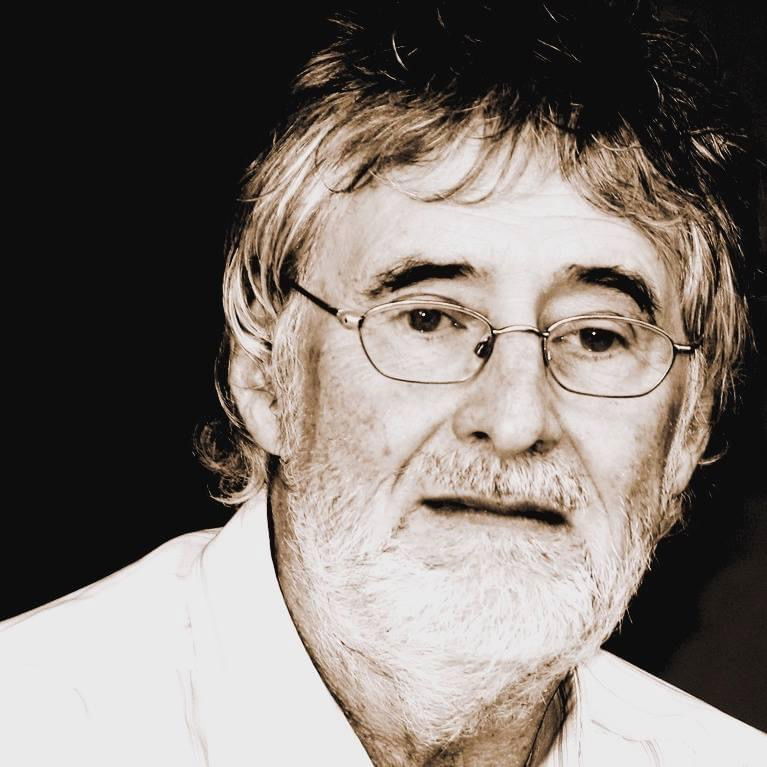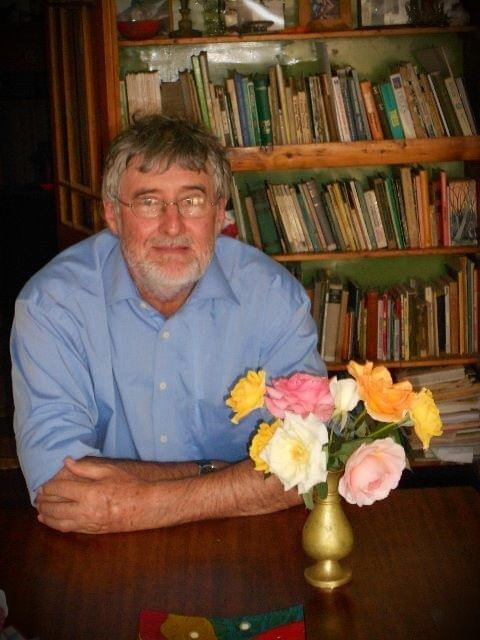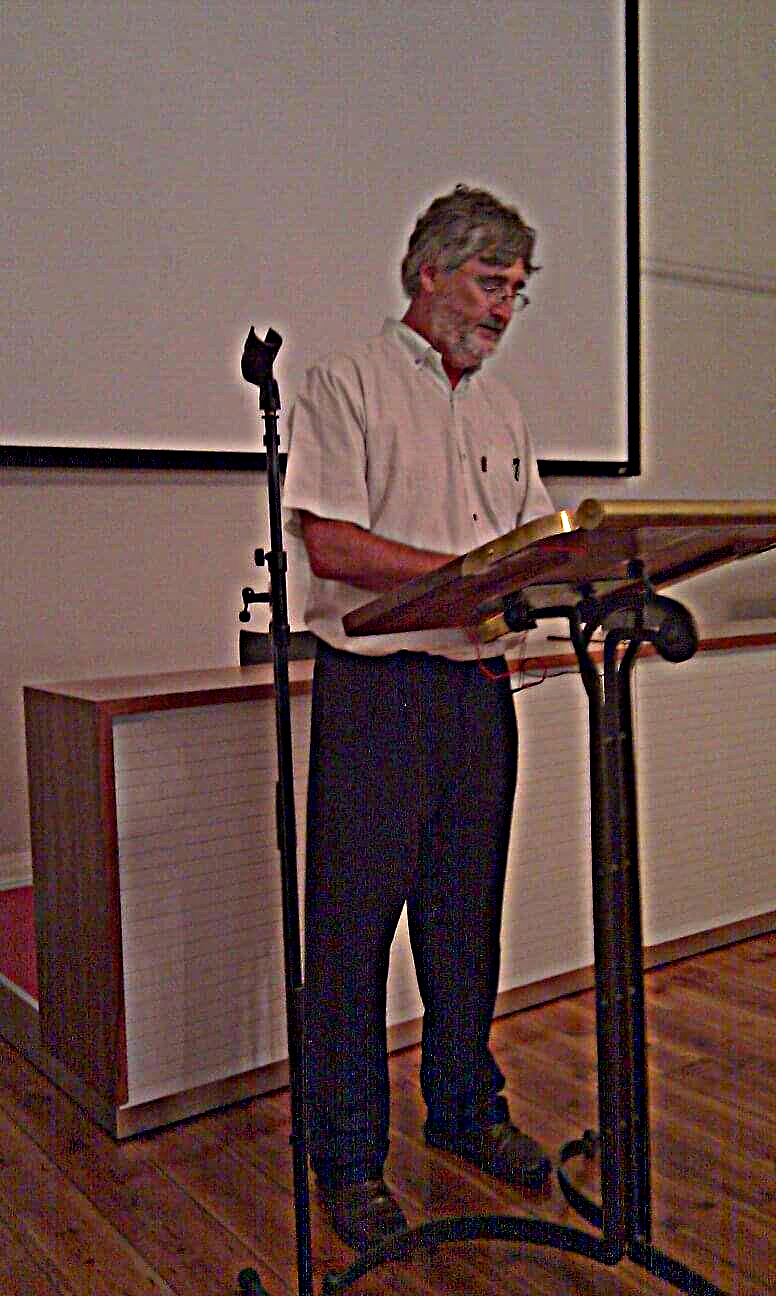50 Years of English Teaching: John Eppel’s experiences since 1971 – an interview with Drew Shaw, January 2021

John Eppel, 2017. With thanks to Dianne Tipping-Woods for the above image.
2021 marks the 50th anniversary of John Eppel’s being an English teacher, mostly in Bulawayo, Zimbabwe, but also in South Africa and England. Now semi-retired, he still teaches English language and literature on a part-time basis at Girls' College - albeit remotely at present because of the coronavirus pandemic. I have known John as a poet, novelist and man of letters, and we have engaged in literary discussions elsewhere. In this interview, however, I asked him to reflect on his half century in the classroom. For teachers, students, educationists and others, a veteran's insights over this length of time are rare and valuable indeed.
What drew you to English teaching? It’s the only subject I had any competence in.
Where and when did you train and start? I did my training, if you can call it that, at the then University of Rhodesia. After a year, which included 6 weeks of actual teaching - I was seconded to Ellis Robins High School - we were awarded a Post-Graduate Certificate in Secondary Education. Highlights of my year there were playing rugby for the university first team and taking part in a performance of Bernard Shaw’s play St Joan. I asked to be posted to Fort Vic High School because a good friend of mine was teaching there, or Northlea in Bulawayo, because I knew it was a relatively happy place. The bastards sent me to Milton, my old school.

Which schools have you taught at over the years? Let me think… Milton High, Cheshunt Comprehensive (in London), Hamilton High, Clifton Primary School (in South Africa), The Thomas More School (in South Africa), Pinetown Boys High (in South Africa), Girls’College (twice), and Christian Brothers College.
Approximately how many students have you taught over these 50 years? On average, about 100 a year. That makes about 5 000.
Has there been a favourite school, an outstanding class, a favourite time and place? No favourites in this job but I can say that the schools where I was least happy were Milton, Cheshunt, and Pinetown Boys High. I recall one outstanding class, at least academically, at Milton in 1971. More than half of those pupils became doctors.

Figure 2. John at Thomas More School, KwaZulu Natal, South Africa 1983. Thanks to John for this image.
Can you recall any examples of very challenging times as an English teacher? Many, especially in my early years when I was inexperienced. The very first year of my career, at Milton, was the worst. I had a class of repeat pupils, some of them 19 and 20 years old. During one lesson I was engaged in an Indian wrestling match with one of the boys when, who should appear, unannounced, at the door? - the headmaster and the provincial Inspector for English. I had a hard time trying to convince them that I was preparing the pupils for a lesson in creative writing. The workload at Milton was almost unbearable for a novice teacher. I had five classes ranging from form One to Upper Sixth. I had to produce the school play. I was a hostel master. I coached cricket and rugby. I was a form teacher. I organized and contributed to the weekly newspaper…. Incidentally, that newspaper got me into a lot of trouble. I had a regular column called ‘’The Adventures of Shocking John’’ in which I honed my satirical skills. At the end of my probation (after two years) I was dealt a ‘’black report’’ by the headmaster. In it he claimed that I was a bad influence on the boys, and that I had lowered the standard of English in the school. A black report meant that you could not go off probation.
What have been your most rewarding experiences? The school holidays.
Have you had any particularly memorable students? Too many to mention, mainly for good reasons, occasionally for making me miserable.

Figure 3. John with Hosni the chicken at Thomas More School. Thanks to John for this image.
How often do you encounter former students, and do you meet any from the very early years? I seldom met any before the internet arrived in the mid 1990s. Outside the classroom I am an introvert, almost antisocial. Now most of my friends on Facebook are ex pupils going back all of my 50 pedagogical years. I value them.
Do you have any anecdotes about memorable colleagues? One of my most memorable colleagues was a maths teacher, a genius. His parking space at school was against the cook matron’s wire fence. He would climb out of his car before it had fully stopped, and let it roll into the fence. I guess his brakes weren’t working. He thought I was the genius because I would talk nonsense to him which he took seriously. I would say something like ‘’Do you consider that paw-paws by way of cardboard components issuing directly from virulent concatenations would necessarily concede?’’ He would frown for a minute and then break into a radiant smile and answer my question by way of mathematical formulae.
Have any of your students become well-known authors or poets like yourself? Yes, especially from Girls’College. Siphiwe Ndlovu, Sue Nyathi, Thoko Madonko, Novuya Rosa Thsuma.
Moving on to your experience of change over the years: what has been different about teaching English in schools in the 1970s, the 1980s, the 1990s, the 2000s, the 2010s? The main difference, of course, was the change from teaching all white classes to multicultural classes. The transition was slow. When I started teaching at Girls’ College in the 80s the classes were about 70% white; today they are about 90% black and brown, which reflects the actual population of Zimbabwe. These colour classifications don’t exist in my classroom.
Have English language and literature curriculums changed significantly? I have taught mainly the Cambridge curriculum and, until recently, it has barely changed. In the past few years language has taken a pseudo scientific turn towards linguistics (articles are now called determiners) while literature has become more multicultural. I welcome the drive towards equal opportunities for all, but global movements have recently accelerated the decolonizaton of education towards ‘equality of outcome’ (which, in Dodo’s words in Alice’s Adventures in Wonderland, is where ‘Everyone has won and all must have the prizes’). I hope this doesn’t lead to a dumbing down of educational aims and outcomes. Teaching would become as boring as copy typing.
Have you noticed generational shifts in attitudes/ behaviour/ awareness/ interests/ academic ability? Have students changed over the years? I don’t think so, certainly not the types. The bullies, the bullied; the hard workers, the loafers; the mischievous, the goody-goodies; the truth-tellers, the liars; the bold, the shy; the neat hand-writers, the scruffy hand-writers. The school I taught at in England was an exception. I was shocked at how afraid of the children the teachers and parents were. And that was in the 70s.
You started teaching before computers were commonplace in schools. Now you may have to tell students to switch their smartphones off. What, in your opinion, has been the effect, on teaching and learning, of new technologies? A lot less attentiveness; a lot more plagiarism
How have you coped with teaching online, with challenges presented by the coronavirus pandemic? What’s your view of online versus face-to-face teaching? Quite well, I think, considering my digital ignorance; but it’s no substitute for face-to-face teaching. In a virtual classroom you can’t get into the zone; there are no ‘’aha’’ moments.
Is there anything that has remained constant about English teaching in schools over 50 years? Yes, the marking load. It’s exhausting.
Now I’d like to ask you about ‘tricks of the trade’. Many teachers are at risk of being totally forgotten, yet you remain extremely popular with almost all of your former students. Why do you think this is? I’m not sure but I think it might be because they sense that I love my subject and that, without being familiar, I love them. Also, I never pretend to know more than I know.

Figure 4. Downing a Castle after a hard day's work at Girls College. Thanks to John for this image.
What do you do in the classroom to connect with your students? Act the clown.
What happens, typically, in your lessons? That depends on how naughty the class is. I am not a disciplinarian. It sometimes takes me precious minutes to settle a rowdy bunch down. It’s not always possible but I like to break the period into three stages: recall the previous lesson; introduce a new topic; start a written assignment on that topic, which can be completed for homework.
What are your main objectives in the classroom, and how do you achieve them? To cover the syllabus in a way that connects it to everything. English lends itself to this - to ‘’see a world in a grain of sand’’.

That’s a wonderful line from William Blake’s poetry to share with your students. Can you share any other successful teaching methods you use? Teach the children to teach themselves. Nothing new in that. I guess that’s not a method. Find out what their interests are and make that your starting point. Transfer a fishing expedition to the eight parts of speech.
How do you prepare and what kind of homework do you typically set? I am continually preparing, by reading, writing, listening, even speaking. You need to prepare way beyond the topic of the lesson. I don’t have much faith in homework. Very few students do it conscientiously, if they do it at all. It encourages last minute copying, and many implausible excuses. I prefer to find time during lessons to at least begin written assignments. I am there to guide. The students can help each other under supervision. The work comes in.
How do you motivate your students? By being interested in my subject, and interested in them.
When discipline issues arise, how do you manage these? In later years I dealt with them myself, either by reasoning with the culprit or making him stand outside the classroom. I say ‘’him’’ because boys are generally naughtier than girls. In my 16 years at CBC I never outsourced a single punishment. This filled my headmasters with a mixture of wonder and annoyance. School rules can be seen as puerile but in an artificial environment, 1000 boys in a relatively cramped space, they are necessary. When I was a schoolboy at Milton, we were punished if our trousers were too narrow; when I was a teacher at Milton, the boys were punished if their trousers were too wide. Fashions change.

Do you have any advice for aspiring new teachers of English: dos and dont’s in the classroom? I reiterate: love your subject; love your pupils.
You’ve taught at all-boys, all-girls and co-ed schools (I think). Have you noticed differences in class dynamics, learning patterns, levels of participation and achievement, etc.? Yes. All-girl schools seem to be academically the most successful. All-boy schools seem to be the most smelly. Co-ed schools seem to be the most convivial.
What’s most different about teaching an all-boys class and an all-girls class? Boys fart a lot more.
The joys of teaching teenagers! What are some typical issues regarding this age group, and have you got any advice? Let them participate fully in your lessons but never force anyone to speak or to read aloud. Respect the introverts. Be aware that their peers are more important to them, for good and ill, than you.
I’d now like to ask you more about teaching English literature. Which authors have you most enjoyed teaching? Shakespeare, especially the tragedies; African authors, especially Achebe, Soyinka and Dangarembga; poetry, especially the Metaphysicals, the Romantics, Thomas Hardy, Robert Frost, and a few contemporaries; great novels by Dickens, Austen, the Brontes, Henry James, and Joseph Conrad; modern drama by Beckett, Miller, and Williams. The list goes on.
At what age, ideally, should pupils be introduced to Shakespeare, and how do you make him interesting? Which of the plays are easiest and most popular? Shakespeare can be introduced quite early, even at senior primary school, in bits and pieces - the witches’ scene in Macbeth, or Malvolios’s yellow stockings in Twelfth Night, or Marc Antony’s speech in Julius Caesar. I think you should wait until about form 2 before you study an entire play. Julius Caesar would be a good choice. For one thing it’s the least rude of the plays, the cobbler notwithstanding. Of course the best way to get pupils to enjoy Shakespeare is to get them involved in the production of a play, not only as actors but as producers and back-stage helpers.
What are your guiding principles as you teach literature? I read the text, word for word with the class, stopping along the way to comment, and elicit responses from the pupils. It is important to put the text into its context. It is important not to shy away from anything some students might find offensive, like the way the image of blackness in many set texts has negative connotations.
What types of literature do students relate to best? The literature that comes out of their own cultures.
Many students are reluctant readers. How do you inspire reading? This is where parents come in. If they don’t read to their little ones they can’t expect teachers to make up the deficit. It is my experience that girls read more than boys. I don’t know why.

Have you got any advice for the effective teaching (and learning) of literature? Not really. At least show an interest in the text.
I’ll turn now to teaching English Language. Over 50 years, have you noticed shifts in how this is taught in schools? It’s moving headlong into linguistics, and the approach is less prescriptive and more descriptive. You no longer have to distinguish between ‘’shall’’ and ‘’will’’.
Does this mean describing the language how it is actually used, rather than how it should be used? Yes.
What do you think are the most important / motivating and/or interesting aspects of English language teaching? The syllabus is not a textbook; it’s the universe. In other words everything is relevant to the subject.
Do you think English lessons (language and literature) can also be lessons for life? How so? Certainly. We are what we speak, write, and think.
What’s the greatest benefit of studying English (language and/or literature)? I don’t know.
Apart from helping students pass exams, is there another role - perhaps a higher purpose - for the English teacher? Yes, familiarize them with a figure of speech called synecdoche, where the part becomes the whole, the comic impulse in the direction of laughter, of community; and the whole becomes the part, the tragic impulse in the direction of weeping, of the individual. You see, in my definition, the part is the individual while the whole is society or community. In literature, comedies end happily, usually in marriage or restored fortune. The individual is reunited with his community. Tragedy, on the other hand, ends unhappily, usually in death or banishment from the community. Paradoxically, happiness and sadness come from the same impulse. As the poet, Byron said, ''And if I laugh at any mortal thing,/ 'Tis that I may not weep''.
That’s an interesting insight to end on. On behalf of your roughly 5000 former pupils and the many other teachers who admire your feat, congratulations on 50 years in the classroom, and thank you for your incredible contribution to education in Zimbabwe and beyond!
APPEAL TO FORMER PUPILS
If you are one of John Eppel's former pupils, we would love to hear from you. You can send anecdotes, pictures and tributes to admin@centre-for-english-excellence.com. Write 'John Eppel's 50th Anniversary' in the subject box.